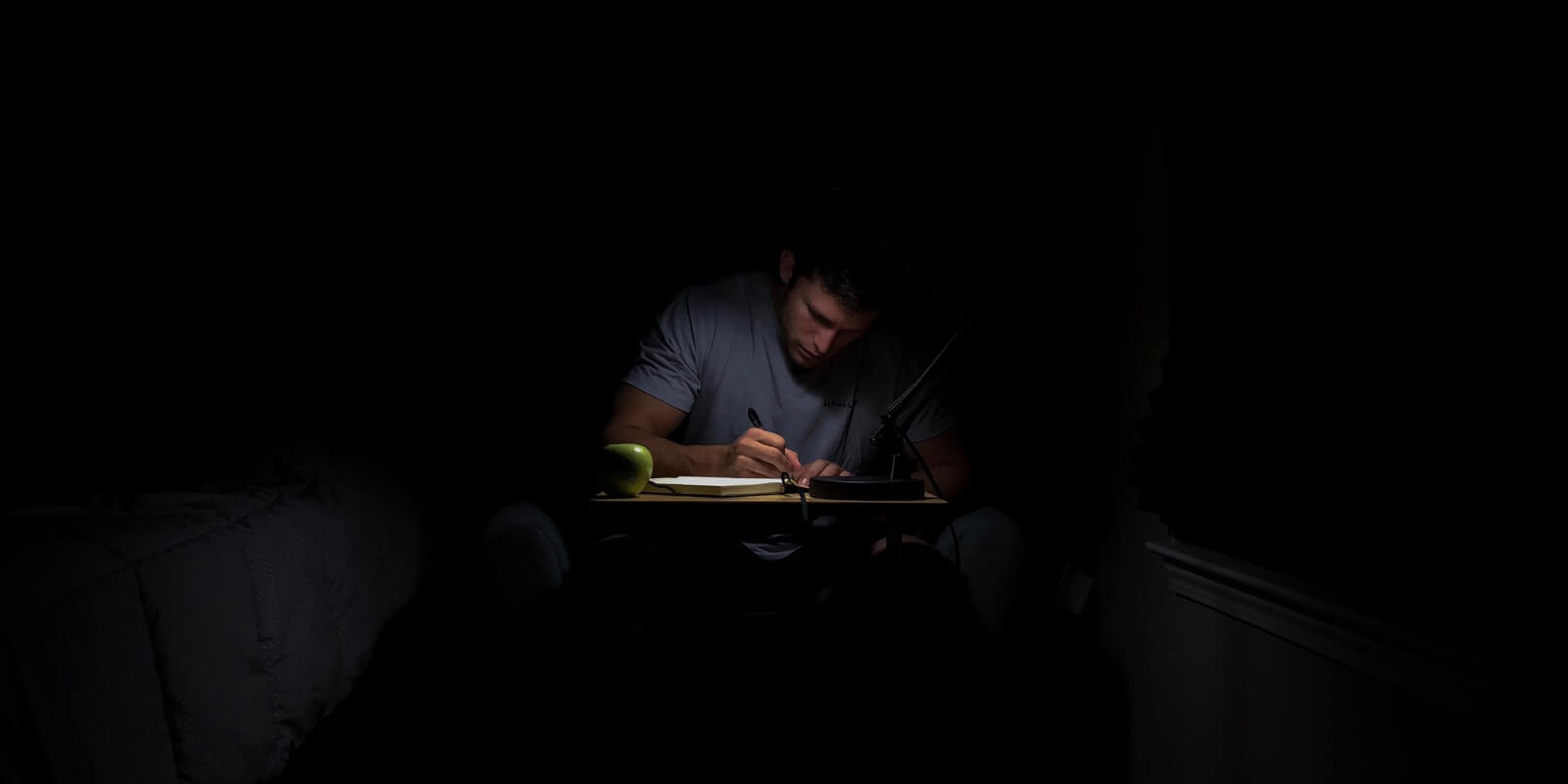People who preach positive thinking are just the worst, aren’t they?
Okay, not really. But doesn’t the endless exhortation to ‘think positive’ or ‘look on the bright side’ every wear on you—especially when you’re already feeling not so cheerful and positive?
It’s invalidating, for one. When our pain is glossed over and we’re told to proceed directly to solutions, it can feel like we’re not really being heard. Consequently, we tend to feel isolated and alone in our suffering.
What’s more, being told to ‘cheer up’ can imply that our concern itself isn’t all that valid—that we’re making ourselves anxious over nothing, sad for no good reason, or that it’s all in our head.
The suggestion to ‘think positive’ is also frequently selfish. Most people are deeply uncomfortable in the presence of other people’s emotional pain. They feel obligated to do something but don’t know what to do. So they suggest thinking more positively as a way for them to escape the awkwardness of having to sit with another person’s pain in relative helplessness.
When people tell us to ‘think positive’ it’s often not so much a genuine attempt to help as a quick fix for their own discomfort.
But even if well-intentioned, the advice to ‘think positive’ is rarely helpful. Most of us have tried this strategy and found it wanting. After all, if transforming painful emotions and difficult moods were as simple as conjuring up a few happy thoughts, every therapist in the world—myself included—would be out of a job.
But that’s the strange part…
There’s plenty of evidence that changing our thoughts and interpretations of what happens to us can profoundly affect how we feel. From the Stoic philosophers of ancient Greece and Rome to modern cognitive behavioral therapy, we know that changing how we think does change how we feel.
So why does positive thinking so often fail to make us happier?
Negative Thinking Isn’t the Problem
At the heart of the thinking positive dilemma is a subtle distinction. We advise people to do more positive thinking because we assume that negative thinking is the problem: If you think about scary things all the time, of course you’re going to feel afraid! If you think about tragic things all the time, of course you’re going to feel sad!
But sometimes life is negative, in which case it makes sense that our thoughts about it would be similarly negative. When you watch a news report about drunk driving deaths increasing in your city, it’s perfectly natural to worry at least a little more about getting behind the wheel.
The typical response to this is that it’s irrational or unrealistic negative thinking that’s the problem. You’re more likely to get struck by lightning than to die in an airplane crash, so why are you worrying about your upcoming flight so much?
But if it was as simple as recognizing that our thinking is a little unrealistic, why do so many of us engage in obviously irrational negative thinking, especially when the emotional costs are so high?
Why do we worry when we know it can’t help and that it will only make us more anxious? Why do we ruminate on past mistakes when we know we can’t change them and doing so will only make us more depressed or ashamed?
Look, we all think negatively sometimes. And from time to time, we all experience irrationally negative thoughts like worries or dwelling on past mistakes. In my experience, neither negative thinking or even irrationally negative thinking is the problem.
What leads to major emotional suffering is too much evaluative thinking.
Why so judgmental?
As a psychologist and therapist, by far the strongest pattern I see among people with chronic emotional struggles is that they are profoundly judgmental of themselves, especially of their own painful emotions.
For example: Everybody worries sometimes. Chronic worriers worry about their worry. They’re afraid of getting anxious. They get panicky when they start to feel nervous. They constantly look for meaning behind every little pain in their body, inflection in another person’s voice, or thought that pops into their head. In short, people who have significant struggles with anxiety tend to be judgmental of their anxiety.
Another example: Everybody feels down sometimes. People with chronic depression get down on themselves for feeling down. It’s one of the great ironies of depression that, from the outside, depressed people look extremely inactive and lethargic. But internally, the storm is often raging. And that storm is usually characterized by extreme forms of self-criticism and brutally negative self-talk. In other words, people who are depressed tend to be judgmental of their own feelings of sadness or lethargy.
On the other hand, one reason many people don’t seem to get trapped in cycles of anxiety and depression is that they don’t judge themselves for feeling bad. Often without knowing it, they practice self-compassion with their painful emotions rather than self-judgment. They acknowledge that feeling that way is hard and unfortunate, but they don’t interpret it as a sign that’s something wrong with them or that they’re broken. Emotionally resilient people, in other words, don’t think evaluatively about their moods and emotions.
The problem with ‘think positive’ is that it primes us for evaluative thinking more generally. And it’s surprisingly easy to go from one form of evaluation to another. For people with chronic emotional struggles in particular, it’s surprisingly easy to slip from “I’m amazing” to “I’m the worst.” So while positive thinking may lead to some momentary relief, it’s not worth it if it kickstarts your evaluative thinking engine in the long-term.
So how should we think?
The key idea underpinning this entire discussion is that just because an emotion feels bad doesn’t mean it is bad or you are bad for feeling it.
And because we can’t directly control our emotions, it doesn’t make sense to evaluate them at all. Emotions aren’t good or bad any more than cloudy skies and rain showers are good or bad.
What if you just stopped evaluating how you felt altogether?
What if you could observe your emotions without judging them?
What if you could describe your emotions without analyzing them?
What if you could feel your emotions without telling stories about them?
What if you committed to being aware of your emotions without insisting on thinking much about them at all?





37 Comments
Add YoursAs a psychologist and therapist myself I want to thank you by putting this idea (which I completely share) so clearly.
Thanks, Susana! Clarity is what I’m really striving for—especially in these short essays. Appreciate you saying so 🙂
Self-compassion? Brilliant thought! This article is close to being a “godsend” to me. With a history of depression and (I’m told) negative thinking, it describes exactly what is felt when I voice “negative” thoughts and emotions. It gives me hope that the directive “…be sure you take the medication” isn’t the only answer. Pam
“What you need to know” is an important feature of your essays, please do not delete!
I usually only do them in my longer list or guide-style articles and not these shorter essays. But good to hear that they would still be valuable.
What I have learned: the trouble with positive thinking is that it’s just more thinking. When thinking has got us into a difficult situation why should we expect that more thinking will help? (Einstein had something similar to say.) Thinking is all very well, and it’s what minds do, but sometimes all that we need to do is notice, with bare attention, without becoming attached to the thoughts. But simply pushing the thoughts away won’t do: whatever you resist, persists. So there’s a deal of subtlety at work here …
Yup, thinking is a tool. Often useful, but when applied incorrectly… not so much.
I agree with your article and have been told my entire life’just stop worrying’ about it… worry serves no purpose so ‘stop thinking’.
My brain does overthink, I admit, but so far, I cannot Stop! I think most people don’t do enough thinking/overthinking. I am convinced that someone or somewhere lies the answer… keep trying. We all know the Thomas Edison story of trying hundreds of different ways of, what must have been all consuming thought and contemplation regarding the invention of the light bulb. But he did it: he did find the answer!
That’s the way I am; I feel like I am giving up if I don’t keep trying (not necessarily to solve, but at least to help). I don’t like to feel as if I gave up.
You hit on all cylinders for me. Do you do ”phone time” with patients???
Thanks Donn. I only see clients locally in my practice.
Your arguments are always so crisp and insightful, yet simple. It’s amazing how a 3-minute read can turn around your day. Thank you!!
That’s great to hear, Elena! Glad you’re enjoying them.
Thank you. I was depressed most of the time when I was younger, and I know depressed people are poor company. But I had a lot to be depressed about. “Cheer up” is a thoroughly irritating exhortation.
Yeah, people mean well but it’s just so unhelpful.
A story.
I was feeling down.
Fiends said to me, “Cheer up; things could be worse.”
I took them seriously, and cheered up a bit.
And things got worse.
Right! Can’t consider a strategy’s effectiveness without thinking through upsides AND downsides.
I’m with you. Yes, a word is missing.
Hi Nick
Could it be How you think so you are.
Stop. Thinking.
Just reinforce grateful thoughts,
Say daily I am enough
I am not preaching ( as my husband would say)
Life is not easy for anyone.It might look as though the grass is greener, wise up.
Everyone has their doubts and fears.
Could Fear be our own worst enemy.
If you must think, think about that.
You are a product of your thoughts
Try, I choose to think I am o.k.
For goodness sake, things could always be a lot worse.
Are we wrapped in our own bubble of un-awareness.
Yes of course we are.
What is comfortable sits nicely.
Become Aware
Life isn’t just about you.
Love and blessings to you all, especially Nick who does such a good job of making us think outside the box
Thank you Nick from the bottom of my heart
No doubt our thoughts are powerful—in fact, it’s precisely because they’re so powerful that we should think more carefully about how we use them—for better or for worse!
Your emails are always a bright spot on a Monday
Awe, thanks Jill 🙂
Thank you Nick for articulating so profoundly such sensible insights into the psyche of a chronic worrier. Even though I am a psychotherapist and very capable of doing the self talk whenever negative emotions bubble to the surface, your insights and suggestions commencing with “what if!” Well done!!!
Thank you Nick for articulating so profoundly such sensible insights into the psyche of a chronic worrier. Even though I am a psychotherapist and very capable of doing the self talk whenever negative emotions bubble to the surface, your insights and suggestions commencing with “what if!” really resonated. Well done!!!
Thank you, this was really insightful and helpful :).
Absolutely brilliant! Thanks for writing this article.
Absolutely brilliant, I practice my English with your texts. (I speak Spanish)
Thanks for your ideas.
Hi Nick
Maybe my husband was right and I do tend to preach- or What if !
So enjoy your work
Blessings to you and all Rita
Thoughts are, in fact, very powerful. I recall hearing Marianne Williamson quote “It’s all in your head”, and the response, “That’s the worst place it could possibly be”.
That’s so funny. My name is also Michelle and I pass along that Marianne Williamson quote all the time. It is SO true.
Thank you very much Nick, I really resonate, I fact I have learned to replace overthing with self affirmation which helps
Your article was short but very informative and mindful
Thanks once again
A very interesting article. It would be wonderful if the five ‘What if’s at the end could be supplemented with ‘How to’s
Nick,
Why is it so hard to kick the negative thoughts? I’ve had them since childhood (I am 54) and they are on automatic! Got any suggestions?
We produce chemicals when we have those thoughts and emotions that we become habituated to. This is why it’s so hard to shake them. I was suicidally depressed for years, so I know the dilemma. I know no one really wants or enjoys those thoughts or feelings – unless there is a secondary payoff. I spent time sorting out what’s valuable in the positive thinking teaching and what isn’t. (I even wrote a book on it, “More Than Positive Thinking.” – I found it helpful to understand that there is a physiological reason we keep thinking those thoughts, as well as reasons based on our experience, our interpretations of those experiences, and our interpretations of the thoughts and feelings, but only when I learned that we can turn it around was all that helpful. The big takeaway here, from me, is that it can be turned around. I found cognitive behavioral therapy most. helpful.
My only thought to the last question(s) is that although I have grown to understand that I don’t have to figure out why or explain myself when I say, for example, “No, I don’t want to do that.”, I still wonder what do we do when there is an expectation to another to explain why I am angry about something??
One of the great directives in my training in grief counseling for children was giving them the room to feel and not having to explain, be pressed to smile or feel differently, or speak about their feelings if they didn’t want to, though always allowing them the non-judgmental safe space to do so..
Speaking about feelings i was just thinking, how little things hurt me and little things make me happy. Good artical.
Every week, without fail, I find something interesting in your newsletter to think about. This, however, made me cry. I finally feel seen. This is just tremendously helpful. Thank you.
Thank you for validating my opinion that “positive thinking” is often not particularly helpful for some of us. Love the idea of acknowledging emotions without analyzing them. Sounds freeing. I will take a run at doing that. Thank you for another great article! You have a way of getting right to the heart of these matters.